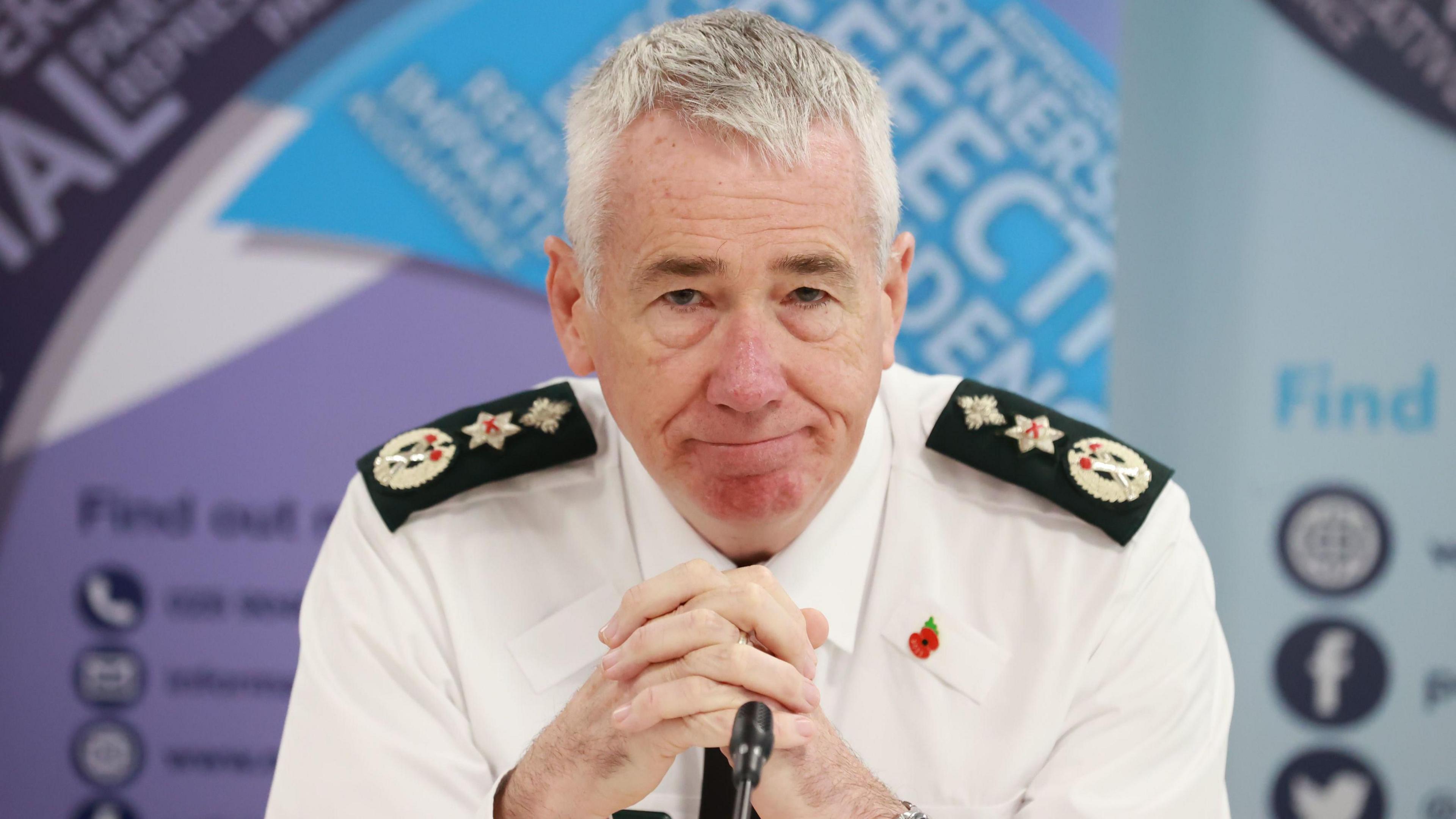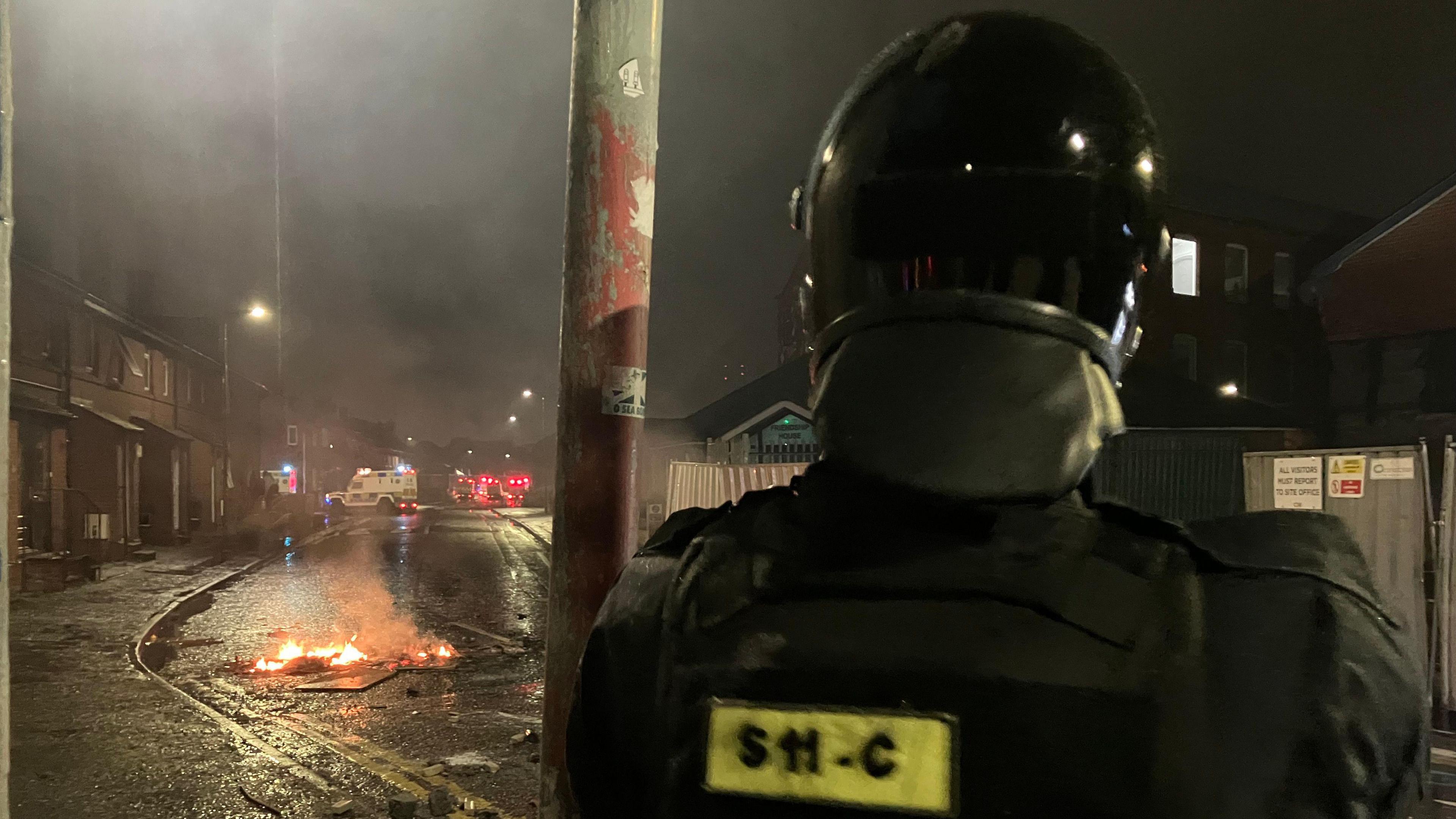PSNI chief tells Muslims 'we are here to protect you'

Jon Boutcher said PSNI officers will "stand in harms way"
- Published
The chief constable of the Police Service of Northern Ireland (PSNI) has labelled those involved in violence on the streets of Belfast as "thugs and criminals listening to misinformation".
In a direct message to Muslim communities in Northern Ireland Mr Boutcher pledged that PSNI officers would be "standing beside you".
"We will be standing in harms way," he said in the video message issued by his force on its YouTube channel.
As the violence broke out again on Wednesday night, the Police Service of Northern Ireland (PSNI) said it had appealed for help from extra officers from other parts of the UK.
It also said it had "significantly mobilised" its existing pool of officers, which would include them working "longer shifts and rest days".

There have been several nights of disorder in Belfast this week
The chief constable said he and other officers attended a meeting at a mosque in Belfast with leaders of all of the mosques across Northern Ireland, where he had listened to concerns.
"It's clear to me that you are living in fear," he said.
"I want to assure you they every officer in the Police Service of Northern Ireland is here to look after you. We're here to protect you."
He said Muslims had been subject to the "most hateful and criminal behaviours towards you as a community by people who are from some right-wing ideology that makes absolutely no sense to me whatsoever".
He said where racist attacks took place it was important to "leave this to the police".
"We will deal with it when it happens and we will deal with it by gathering evidence and going getting those responsible and bringing them before the courts," he promised.
Disorder and violence
The chief constable's message follows several nights of violence in Belfast including racially motived attacks and rioting.
A number of businesses were targeted after an anti-immigration protest at Belfast City Hall on Saturday.
Further disorder erupted on Monday and Tuesday evening, while a woman's home in Ballyclare was targeted on Wednesday.
The BBC has been unable to secure an interview with the chief constable since the violence began but has approached the PSNI again with a fresh request.
On Wednesday, six more people were charged with offences related to disorder in Belfast.
The PSNI said the charges related to incidents in Rathlin Street and the Shankill Road area.
Three men - aged 26, 28 and 41 years - have been charged with offences including criminal damage, riotous behaviour, incitement to hatred and possession of an offensive weapon in a public place.
They are due to appear in court on Thursday.
They were arrested in connection with reports of damage to homes and cars in Rathlin Street.
Three boys - aged 16, 16 and 14 - have been charged with riotous behaviour after being arrested on Tuesday in the Shankill area.
They are due to appear in court on 2 September.
What steps are the police taking?
As the chief constable appeals directly to the Muslim community, the PSNI is mobilising more officers due to concerns over further racially-motivated attacks in coming days.
Officer shift patterns are being adjusted and rest days cancelled.
It will result in an increase of officers on the streets, which should be visible.
Chief Constable Jon Boutcher will update the Stormont executive on Thursday morning.
The police do not believe loyalist paramilitary organisations are orchestrating or co-ordinating things.
However, known loyalist paramilitary figures have been engaged in some of the protests.
Police and loyalist sources have spoken of weeks and months of simmering tensions which are boiling over.
They point to housing protests fuelled by anti-immigration sentiment, such as in Belvoir estate in November.
Police data has also shown a year-on-year rise in racially-motivated incidents.
But the trigger has been the Southport stabbings and associated protests and trouble in England.